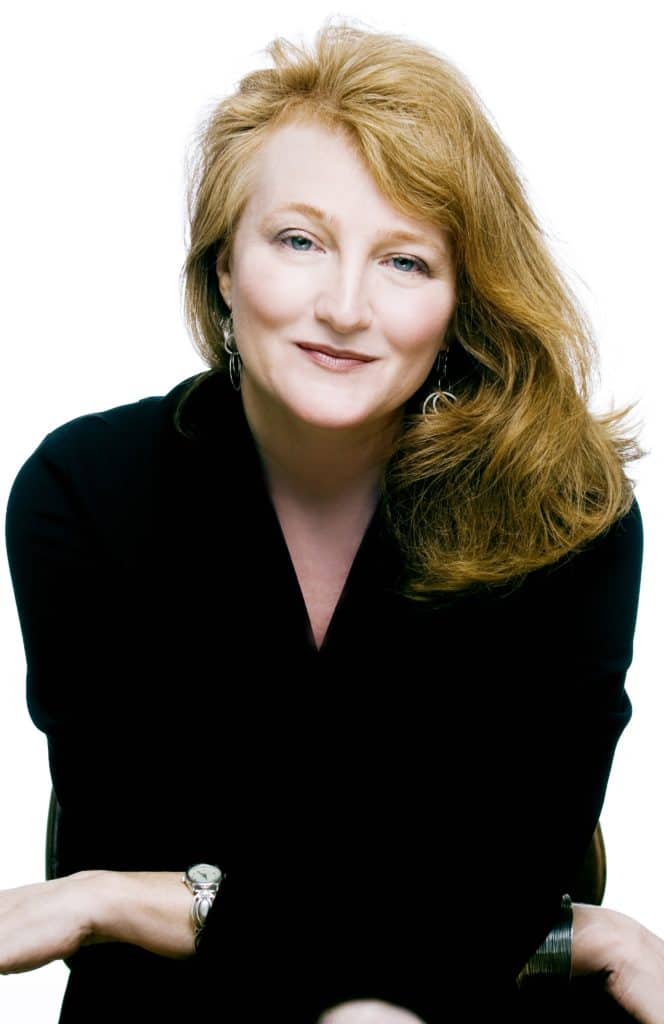Krista Tippett brings faith to public radio

Krista Tippett has been hosting the public radio show “On Being” (formerly “Speaking of Faith”) since 2003. Every week she gently but passionately probes the heart and mind of a new guest—pastor, scientist, poet, philosopher, practitioner—identifying and gathering treasures along the way. She asks the big questions as well as the intimate ones, searching for the ways in which each person’s very particular journey illuminates the human story.
The granddaughter of a Southern Baptist preacher, Tippett grew up in the Bible Belt but studied history at the liberal Brown University in Rhode Island before going to West Germany on a Fulbright Scholarship to study politics in Cold War Europe.
As a journalist she wrote for the New York Times, Newsweek, the International Herald Tribune, the BBC, and Die Zeit. After earning an MDiv from Yale Divinity School, Tippett recognized a distinct lack of intelligent reporting on religious faith in the media. It was in the process of conducting a vast oral history project for the Benedictines of St. John’s Abbey that Tippett hatched the idea of conducting “conversations about the spiritual and intellectual content of faith that could open minds and enrich public life.”
The result was the show she launched on public radio in 2003 and that today is broadcast on over 200 US public radio stations and globally by NPR. Tippett is also the author of Speaking of Faith: Why Religion Matters—and How to Talk about It (2008), Einstein’s God: Conversations About Science and the Human Spirit (2010), and Becoming Wise: An Inquiry into the Mystery and Art of Living (2017), all from Penguin.
We caught up with Tippett to turn the tables and ask her about the challenges of bringing faith to public radio, the joy of eavesdropping on others’ spiritual journeys, and the mystery that keeps her coming back for more.
You talk to people from every type of spiritual background, influence, and practice. How does what you hear from your subjects inform your own theology and practices?
The origins of this project were with an ecumenical institute, St. John’s Abbey in Collegeville, Minnesota. Not a famous place but a really influential place in the 1960s and ’70s in ecumenism. One of the things I started to learn there that applies to the experience of how the radio show affects my own spiritual life is that a profound encounter with religious difference actually has a paradoxical effect: Yes, your heart and mind are opened to another tradition in a way, but you also understand your own identity better.
I would also say that I have a much more expansive sense of mystery. Through all these conversations over all these years I have less of a need to tie everything up. I experience mystery as something rich and beautiful in and of itself. I wouldn’t say that I do these conversations and then go away and question or jettison anything. It’s more that these traditions—and more than that, these people, the integrity of these lives—are in conversation with my own life. It’s more of an interplay than something that’s challenging.
How has that affected your appreciation for the God who created all that diversity?
I was raised Southern Baptist, with the belief that nobody else was going to heaven, not even Methodists. But I don’t believe that. There is something in me that just resists that assertion, and I also don’t think that’s something I have to know or figure out. Especially, I think, from an orthodox Christian perspective, there is some element of mystery in the existence of the religious other, in the deep integrity of the religious other. And not only does it not contradict the core of my faith, it actually enriches it. Which in and of itself is kind of a mystery—so there you go!
A profound encounter with religious difference has a paradoxical effect: Your heart and mind are opened to another tradition, but you also understand your own identity better. I have less of a need to tie everything up. I experience mystery as something rich and beautiful in and of itself.
My faith is enriched from all these conversations—and then I just have a really normal life, with all the same kinds of challenges of parenting and relationships and life and finding meaning that everyone else has.
What is one surprising thing you’ve learned about faith or people since launching your show?
I’m surprised all the time. But one thing I did not anticipate when I started doing the show was that I’d be interviewing a lot of scientists. Even in the last 10-year period, neuroscience and physics in particular have continued this rapid evolution. I see people working in the fields of neuroscience and biology and physics as some of the richest sources of theological questions. This has nothing to do with whether the scientists themselves are religious or not. But the work they are studying is throwing out all of the basic theological questions of the 21st century to consider anew. I think it’s fascinating how much spiritually and theologically provocative work is being done by scientists.
I’m also surprised by what a very robust vocabulary of mystery and beauty scientists have. I think there’s something there for religious people to learn from.
How do you feel about being interviewed?
I really like both ends of a conversation. When I’m the interviewer, if a conversation is successful I lose control in a way, and it yields surprises. But I’m still managing it, right? Still directing and guiding it. So I like this as well; at this end of the conversation I’m more vulnerable in a sense because I don’t know what’s going to come at me, but I can also just relax into that.
What’s one question you wish someone would ask you?
By being asked good questions you can put words around something that you didn’t even know you thought. It’s helpful to me when people ask me to connect the different chapters of my life. I learn things that I hadn’t really seen before. So I think it would be fun for somebody to really push me on what’s the trajectory from growing up Southern Baptist in Oklahoma to living in divided Berlin to starting this radio show. In a funny way I feel like the show takes me back to the kind of diplomacy and worrying about the state of the world that I was doing in my 20s but from a completely different direction, so I think it would be fun to be really pushed to figure out what that circle is.
A good question is a gift. I start all my interviews by asking people—whoever they are, whether they’re religious or not—about the religious background of their childhood. And that question is a gift to people. Even if they haven’t reflected on it that much or they’ve lived very far away from it, that’s a piece of us that’s formed us and it’s often a place where the experience was positive or negative. It’s often a place where we started asking these really searching questions that we then followed for the rest of our lives. And to send somebody back there, in a safe space, to look at that is a really wonderful thing.
I had to defend that question a lot in public radio, especially in the beginning, and it doesn’t always make its way into the show; sometimes it gets edited out. But the reason I ask people that is because almost everyone has a really interesting story. And every atheist has an interesting story, too—it’s not just the most deeply religious people. There’s a story there. But the more important reason I ask that question is because of where it plants people in themselves—a place that’s softer and more searching and questioning than what we’re more skilled in presenting to the world, especially when we’re talking about what we know.
What pages of your Bible are the most worn?
I go through different phases. I really love the Philippians 4:8 passage about whatever is good and true and right, ponder these things. That is also what I try to do as a journalist, and I think it’s important for mental health! We’re in this world where we’re surrounded by devastating images of darkness, so it’s important to have eyes to see and ears to hear as a spiritual discipline—not just focusing on what is most immediate and what is handed to you to focus on, but looking for what matters, looking for goodness, looking for where you want to put your energy as opposed to what is thrust at you.
There are places in Proverbs that I really love. And I love Genesis. I love its layers and layers of truth about us as human creatures—most of it I never had any inkling of in Sunday school. I’ve been talking to Ellen Davis—she’s at Duke now, but she was my professor of Old Testament at Yale. In the last 10 or 20 years she’s become very focused on environmental stewardship. I talked to her about Genesis, and she made me see for the first time that eating is everywhere, food is everywhere, and this idea that we are creatures among other creatures.
My daughter was born while I was at seminary, which was not in the five-year plan, and I got really fascinated with Jesus’ idea about the humility of a little child. It was one of the biblical ideas that I never got and hadn’t taken very seriously, but when I had a little child and I was trying to understand it I became aware that the humility of a little child is not the stereotype of humility that we have in our culture—it’s not about debasing yourself or making yourself small; it’s about moving through the world with an attitude of curiosity and wonder about everything. It’s taking everything else as potentially amazing and being willing to be surprised and blown away, and it’s closely linked with delight. When I started thinking about that and looking through the Bible for that, I discovered that delight is tucked away everywhere. Sometimes it’s hidden and you only find it in the secondary translation—for example, Eden means delight.
At times the Psalms have been very important to me, too.
You’ve journeyed with depression, and in your book you write that pain has gifts to offer us. What has been the gift of your depression?
I always hesitate before I say something like that, because it’s a privileged thing to be on the other end of pain where you see it as a gift. I think it’s really important to qualify it, because in the middle of a lot of pain, there’s nothing gift-like about it. The gift is something that shows itself over time.
I hear versions of this in all my interviews. We all carry something or some things, and those are our connection to the world and to the pain of the world. They make us open to it and make us capable of compassion in a way that we just can’t be until we’ve been there. Depression is such a big, dark place, and you become vulnerable. Well, we’re always vulnerable, and that’s the thing. We’re all so vulnerable, but we’re not always confronted with that. We’re able to pretend it’s not true. But vulnerability is the human condition, and when you have these conscious experiences of it, it puts you in touch with the rest of humanity in a different way.
In her book An Altar in the World, Barbara Brown Taylor writes, “Earth is so thick with divine possibility that it is a wonder we can walk anywhere without cracking our shins on altars.” Where have you cracked your shins on God’s presence lately?
I was at a gathering convened by a wonderful peacemaker/conflict-resolution expert named John Paul Lederach. He’s Mennonite and probably the greatest living exemplar of that Mennonite Christian tradition of really taking the calling to be a peacemaker seriously. He pulled together neuroscientists and artists and contemplatives and conflict-resolution people for the kind of conversation across disciplines that’s happening now that’s so new—it shouldn’t be, but we just did so much compartmentalizing in the 20th century—and it was just miraculous.
There was a poet there from Sierra Leone and a poet from Northern Uganda, and these are two of the places in the world that yield the most horrific stories right now—the kind of stories that make me despair. The Lord’s Resistance Army, the civil war in Sierra Leone, people’s hands being chopped off—I don’t know what to do with that, I despair at the state of the world, and those kinds of stories do occasionally just make me question everything. Right?
It was amazing to meet these people whose world that is and who are not just courageous but joyful and who were making poetry, being a healing presence in the midst of that as poets, and helping people give voice to the kinds of things that other kinds of language can’t. What happens in those darkest places in the world defies what our usual language can talk about or touch.
You might say it’s so simple, how can it even make sense or be valid to make poetry in such circumstances? But there is something about how as human beings we are able to find beauty and be beauty in the worst circumstances. It was very, very humbling. And it also reminded me—this is one of the things I try to remember all the time, and it gets back to having eyes to see and ears to hear—that even when you hear the worst story about Sierra Leone or Northern Uganda, there is so much human possibility in those places that doesn’t come through in those stories where we freeze people in the worst moments of their lives. We have to stay attentive to that human possibility—and hopeful about it.
This interview was conducted in 2014 and originally published in CSA’s PRISM magazine; updates have been made to reflect Tippett’s more recent publications. In August 2014, Tippett received the National Humanities Medal at the White House for “thoughtfully delving into the mysteries of human existence.” Learn more and listen to Krista Tippett’s interviews at OnBeing.org.
Kristyn Komarnicki is the director of CSA’s Oriented to Love dialogue program, building unity that is deeper than difference. One of her favorite Tippett interviews is with poet and theologian Pádraig Ó Tuama, who leads the peacemaking community of Corrymeela in Northern Ireland. You’ll want to listen to “Belonging Creates and Undoes Us Both.”


